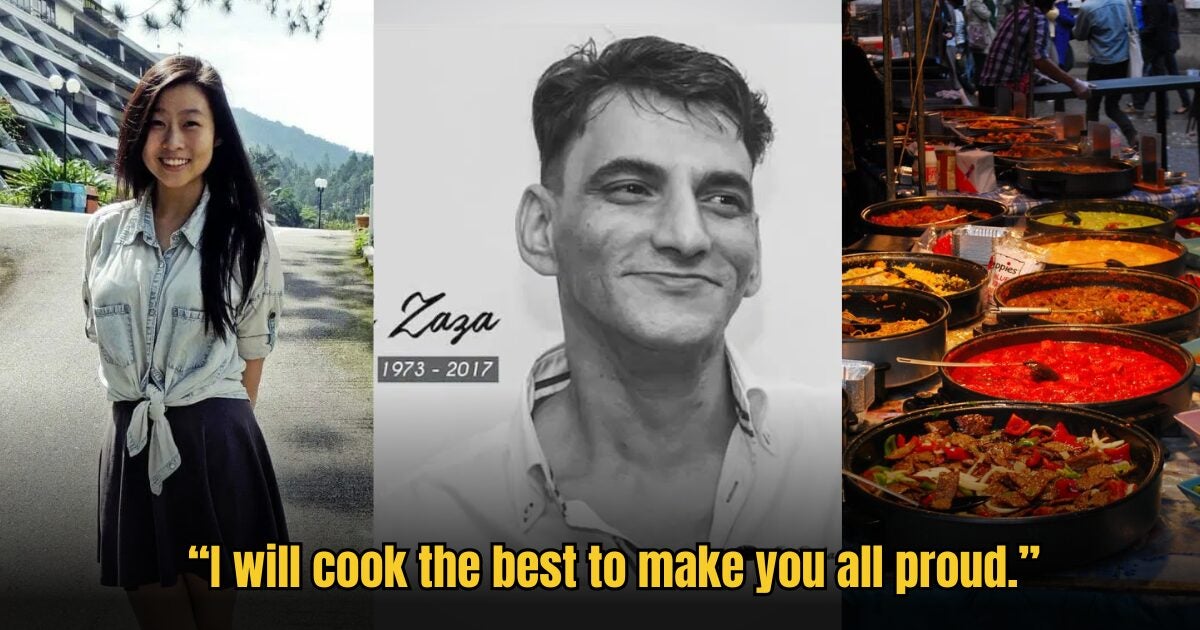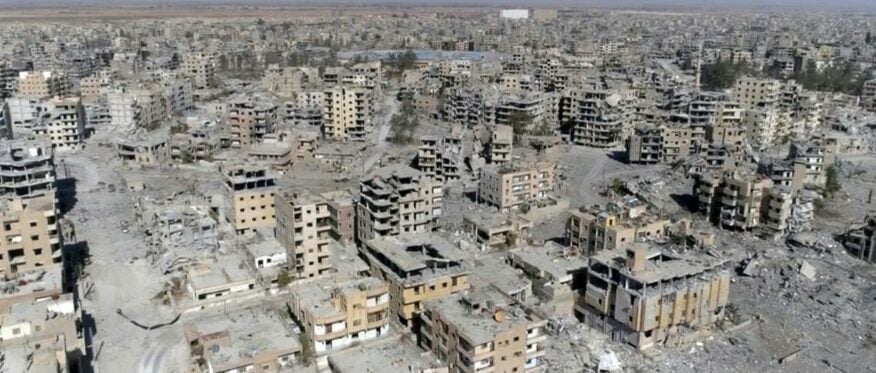
This story is about a Syrian refugee named Zaza who became a chef in Malaysia after his hometown of Raqqa was bombed.
I’m Suzanne, the co-founder behind PichaEats, a social enterprise that serves catering food cooked by refugee chefs living in Malaysia. This is the story of our first ever refugee chef, Zaza.
Zaza was from Raqqa, Syria. In our 2nd month, he joined us as one of the pioneer chefs together with his wife Rania and son, Tai.
Raqqa was the HQ for Isis for many, many years. And at the time, the US, Russia, the Syrian government – everyone was attacking it, because they wanted to drive the terrorists out. If you google Raqqa now, you will see photos of a totally destroyed city.

Image via TRT World.
They tell you that when you come to Malaysia, the people here will welcome you and take care of you. But instead, the agents take all your money and when you arrive in Malaysia, there’s nothing waiting for you. A lot of refugee cases are like that.
When we started PichaEats, we were looking for chefs, so the UN told us to look for Syrians because they are really good chefs.
We formed a very good working relationship with Zaza, because he truly had a very good heart. He is the kind of person who will cook extra food for the cleaners and runners. Every runner that picks up food for them will get one box of food for himself.
He always poured out so much love to all of us; he would always tell us, “When the war ends, the three of you should come back with me to visit.”
He would say things like, “Oh you have guests coming over? I will cook the best because I wanna make you all proud.”
He will always give his ideas to grow the business, because he knows that when the business grows, more refugee shares get to be on board.
After being with Picha for a year, life really changed for him.
One day, he bought a cup of Starbucks and sent a photo to us. He’s like, “Hey, I bought Starbucks.” They could never ever afford Starbucks, and now they could. It was all these little things that made them truly very happy.
But unfortunately, life is always very funny, and weird, and unpredictable.
In February 2017, Zaza fell very sick.
At first we thought it was anemia, so we gave him iron tablets. But by the end of February he got so weak that he couldn’t breathe. He had to go into the emergency ward. His wife rushed him to the hospital.
He had to wait for me to arrive to register him, just so that they could take him in.
If you don’t know, refugees cannot actually get seen by a doctor unless they can get a local Malaysian to guarantee that they will pay for them.
When I arrived, we went straight to the critical zone. They took his pulse and said his blood pressure is low, blood count is low — everything was low.
A few days later, everything took a very unexpected turn. They told us that he might have cancer. He was hospitalized, they did a lot of checks on him, took a bone marrow sample, and they did a lot of tests. Eventually we were informed it was bone cancer.
In May, before we could even react, he passed away.
It was so sudden. None of us were expecting it; only two weeks ago, the doctor told us he’s going to get discharged.
I remember that day very clearly. We were at the hospital at 2pm, sitting there, praying. It was a strange scene — different religions praying different prayers. I prayed, “Please don’t go, please come back.”
At about 5pm, he left us. His organs had just shut off, and he just left, very suddenly.
It was one of the most painful moments we had in Picha. Zaza used to be a stranger to us, but now, his death has affected us so much.
We asked ourselves, should we continue to do this? It’s so painful, do we still want to do it?
One thing that really helped me to keep going was what happened a week later, when we went to check on his wife, Rania. We asked her, “Is everything ok?”
She replied: “Knowing that I’m with Picha, Zaza wouldn’t be worried about me even though he’s not around.”
When Rania said this, we realised that PichEats wasn’t just a way for them to be supported financially; it was community. A friend in Malaysia when they don’t have anybody else.
Two weeks before Zaza passed away, I went to the hospital in Ampang to see him.
He was doing quite good that day. He said to Rania, “Ramadan is coming, make sure that we have a good Ramadan menu.”
I’m like, “But dude, you’re sick!” But he was someone with such a big heart.
He said, “When I get discharged, I will cook chicken Mandi and give it out for free at the mosque to Malaysians.”
Because that’s how he wanted to give back to Malaysia for having him.
Then he said he wants to do this under Picha’s name, not Zaza’s name. He wanted to give out food for free, with his own money. That’s what an amazing man he is.
I think from this whole short one year with Zaza, he showed us how he could make a change just by being him. By doing what he does best, which is through food.
And because he has been doing that, it has impacted so many of us to hear his story, and to know that a simple act like this can make a huge impact.
What did you think of this story?
Tell us in the comments!
Send an email to ym.efillaerni@olleh and you may be featured on In Real Life Malaysia.
Read also: I Paid RM12,000 To Move To Malaysia Only To Become a Dishwasher at a Mamak
I Paid RM12,000 To Move To Malaysia Only To Become a Dishwasher at a Mamak
More from Real People
‘A RM100 fee cost a company 5 years of revenue’ shares M’sian
This story is about a Malaysian who learned that bureaucracy can be defeated simply by not arguing with it.A billing …
‘I quiet-quit, upskilled, and tripled my salary,’ shares M’sian engineer
This story is about a Malaysian who learned that loyalty without leverage leads nowhere in the corporate world.After years of …
‘I did everything right, and it still wasn’t enough’ shares M’sian graduate
This story is about a Malaysian graduate navigating big dreams in a job market where a degree no longer guarantees …















